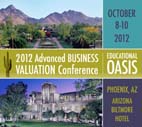
| July 25, 2012 | Issue #118-3 |
What aspect of malpractice keeps you awake at night? What are your three top concerns related to potential malpractice liability for your forensic accounting or BV practice? Do you worry about not getting enough information from the client or the lawyer on a particular case? Reaching a “bad” result? Making a mistake in the valuation method or even in the math? Or do you simply worry that your current policy won’t provide enough coverage for a claim? That’s just one of the more important questions that Mike Crain (The Financial Valuation Group) and Gail Markham (Markham Norton Mosteller Wright & Co.), along with attorney Michael Corso (Henderson Franklin), are asking you to answer in their new online survey on malpractice issues for BV and forensic accounting professionals. The trio plan to use the findings in their session on the same topic at the AICPA's annual BV and forensic accounting conference this November in Orlando, Fla. The survey won’t take long; to participate, please click here now. BV experts without websites ‘don’t exist,’ says attorney “If you don’t have a website by now, get one; otherwise you don’t exist—not in my professional opinion,” said attorney Randy Kessler (Kessler & Solomiany) at this year’s NACVA Consultants’ Conference in Dallas. “If you’re not on the Internet, you’re not legitimate.” Once you’ve established a website, update it regularly, Kessler said, with “content, content, content.” Post your latest articles and publications, along with pictures and videos, because Kessler and other attorney/referrals will want to know: “Who am I hiring?” If you’re comfortable testifying, he said, then you should be comfortable enough in front of a camera to post a short clip that shows “what kind of impression you’ll make on the witness stand.” Would you post your fees on the Web? Your website/domain name should include your own name (for solo practitioners) or your firm’s name. Your email address should include your website name and so should your letterhead. Kessler also suggested posting your fees on your website, so that any potential clients “won’t be shocked” by your prices and you don’t waste time talking to anyone who can’t afford you. Use Twitter, Facebook, and LinkedIn as marketing tools, he advised NACVA attendees, and blog about interesting topics in your field. “What’s even more important than blogging?” he asked. Answer: Emailing personalized links to your referral list. (“John or Jane Attorney, I thought about you when I read this case, and I just blogged about it here.”) To those experts who worry about their blogging coming back to bite them on the stand, Kessler said, “Everything can be used against you.” Don’t be scared, but don’t blog your analysis or opinions, either; just provide general notice and information. And be sure to set up a Google alert for your name so that you can monitor your ever-expanding presence on the Web. Bankruptcy judges ‘inherently suspicious’ of valuation adjustments and alternative methods, says one of their own Bankruptcy judges “have become familiar and comfortable with the DCF, comparable companies, and comparable transactions methodologies,” writes the Hon. Christopher S. Sontchi, U.S. bankruptcy judge for the District of Delaware, in his new article in the Spring 2012 American Bankruptcy Institute Law Review (available by subscription or purchase from ABI). “Indeed, these methods are often referred to as the ‘standard’ methodologies," said the judge, adding:
Similarly, although financial professionals will often add a risk premium or other adjustment to their selected approach, “judges are inherently suspicious of these adjustments,” Sontchi says, concerned that they are “being made to manipulate the valuation to reach a predetermined result.” The valuation expert also risks “confusing the judge” with any alternative method or adjustments. “Remember, most bankruptcy judges are ‘self-taught’ in corporate finance.” In fact, Sontichi credits an “excellent treatise” by Professor Aswath Damodaran as his primary source: Investment Valuation: Tools and Techniques for Determining the Value of Any Asset (2nd edition, 2002). Although the article is a bit basic for BV experts, the judge’s peers are reading and referring to it. In a recent case, bankruptcy judge Richard Fehling cited Sontchi’s work as “an excellent article”—and then proceeded to find one expert’s use of the cost method as “strikingly inappropriate” to value technology. Moreover, in his “hypothetical” capitalization of income approach, the expert seemed to have pulled his figures “from thin air.” Read the complete digest of Holber v. M&T Bank (In re Scheffler), 2012 Bankr. LEXIS 2568 (June 5, 2012) in the August 2012 Business Valuation Update; the court’s decision is posted at BVLaw. Little time left to comment on APB draft or apply as SME There’s less than a week remaining to comment on the Discussion Draft—The Valuation of Customer-Related Assets, issued by the Appraisal Practices Board last June. The deadline for sending written feedback is July 31, and all comments should go to VFRcomments@appraisalfoundation.org. Email any specific questions on the discussion draft to Paula Douglas Seidel, the APB’s executive administrator, or call her at (202) 624-3048. The APB is also still seeking subject matter experts (SMEs) for its latest project on valuing contingent consideration. Completed applications must be received by August 6. Email any questions on the SME panel or the APB to Staci Steward, practices administrator, or call 202-624-3052. ASA bringing its BV and international conferences together, with special session on SEC/IVSB oversight This year, the ASA’s Advanced Business Valuation Conference joins its 2012 International Appraisers’ Conference in Phoenix on October 8-10. Among the more than 30 educational sessions on business valuation, fair value, practice management, and litigation support, a particular highlight will be “Raising the Bar for the Valuation Profession,” presented by Anthony Aaron (Ernst & Young), a member of The Appraisal Foundation’s Board of Trustees, and Steven Sherman (KPMG), current chair of the International Valuation Standards Board. Both speakers are currently engaged in dialogues with the SEC and other standard-setters about bringing greater consistency, quality, and transparency to the work by valuation professionals. They will also discuss U.S. as well as global efforts to strengthen quality and credibility within the BV community. For more information about all the sessions at this year’s ASA conference and to register, click here. Sontchi also says courts still prefer use of “Courts have consistently held that the use of actual market data is the preferred method to value an asset,” Judge Sontchi writes in his ABI Law Review article, referenced above. At the same time, he recognizes that “finding similar and comparable assets and/or firms is the challenge” of any such “relative” valuation. “Given that no two companies are exactly alike in terms of risk and growth, the definition of comparable firms is a subjective one,” he says. “Consequently, a biased analyst can choose a group of [comparables] to confirm his or her biases about a firm’s value.” Another problem, Sontchi says, is that the market might err in valuing the comparables—e.g., the current tendency to overvalue software companies. Although experts try to control for the differences between the selected benchmarks and the subject company, the multiples are “easy to misuse and manipulate, especially when comparable firms and comparable transactions are used.” Get current on the most credible uses of the market approach in today’s turbulent times: On August 2, join Robert Schlegel (Houlihan Valuation Advisors), Alina Niculita (Shannon Pratt Valuations), and Chris Treharne (Gibraltar Business Appraisal) for The Market Approach Today: Deciphering Messages From Markets, Courts, and Common Appraisal Errors.
To ensure this email is delivered to your inbox, please add editor@bvwire.com to your e-mail address book. We respect your online time and privacy and pledge not to abuse this medium. To unsubscribe to BVWire™ reply to this e-mail with 'REMOVE BVWire' in the subject line or use the link below. This email was sent to %%emailaddress%% Copyright © 2012 by Business Valuation Resources, LLC |
|




